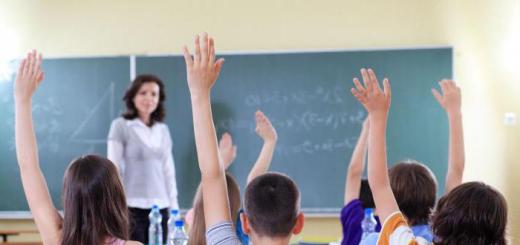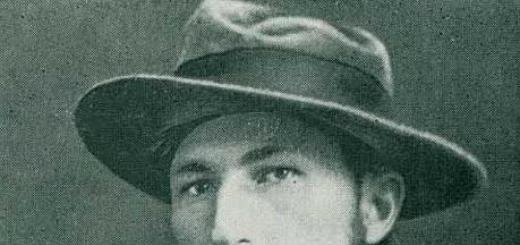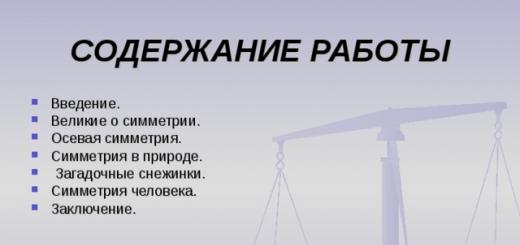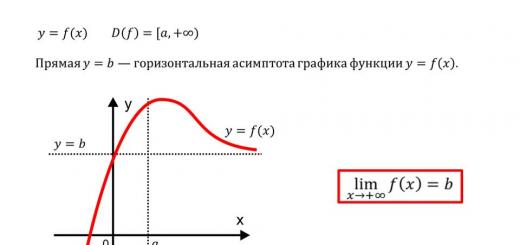KULIKOVA T.D., teacher-speech therapist, GBDOU d/s No. 62, St. Petersburg
Economic, social, and environmental activities carried out in society have not led to a decrease in the number of children with health problems. According to detailed diagnostics in preschool institutions, up to 60% of children have certain problems:
Various speech disorders;
Hearing impairment;
Hyperactivity with attention deficit;
Bilingualism.
In this situation, it is necessary to increase attention to the issues of protecting children's health, a person-oriented approach to training and education, active differentiated assistance from specialists, and comprehensive psychological and pedagogical support for the child for his further successful socialization.
The relevance of this problem is determined by the peculiarities of the modern social and educational situation: the increase in the birth rate of children, the reduction in the 1990s. the number of preschool educational institutions and, accordingly, competition among them; the busyness of parents and the remoteness of a special kindergarten from their place of residence, as well as the reluctance of parents to recognize their child’s problem as important and to work on it together with specialists.
At the present stage, many kindergartens do not have speech therapists, speech pathologists, or psychologists on staff, which creates difficulties in organizing quality support for children with developmental problems. Experience shows that in a regular kindergarten it is necessary to look for new educational technologies, use more flexible forms of work in order to achieve more effective results and help all children reach their maximum potential.
The most advanced education system currently being introduced, the so-called inclusive education, implies its availability for all children, including children with special needs. Speech therapy assistance as an additional educational service is a particular example of the introduction of inclusion into the activities of a modern kindergarten.
According to the results of diagnostics carried out at GBDOU No. 62 in St. Petersburg, 75% of children have problems in speech formation, impaired auditory function (I-II degrees of hearing loss), mild stuttering, hyperactivity, and bilingualism. Parents were asked to apply to special preschool institutions, but 50% of them chose to stay in this institution, so correctional support for their children was organized for them through the additional education system.
One of the links in this system was classes with a speech pathologist (a specialist with two specialties) under the correctional programs “From Letter to Word” and “Speaking Correctly”, aimed at correcting pronunciation deficiencies, developing higher mental functions, individual speech correction and general speech development . The number of classes consists of two group (20-25 minutes each) and two individual (15 minutes each).
The main goal of the classes is the maximum development of speech function, relying on the child’s capabilities in close connection with the formation of all mental processes: attention, perception, memory, thinking, inner speech, involved in the intellectual development of the individual.
Corrective measures are aimed at developing the child’s mental functions and enriching his practical experience, along with overcoming existing disorders of motor skills, speech, sensory functions and behavior. The effectiveness of classes depends on the selection of forms and methods of their implementation.
Each lesson is a mini-project, including the problems of a specific group, ways to implement them through games, dramatization, phonetic rhythm, vocal exercises, inventing fairy tales with your toys, discussing and demonstrating practical experience, composing mini-poems based on rhyming words, all kinds of puzzles, lotto, role-playing games for the “on-duty” speech therapist, closed pictures. The results of the lessons are a summing up of the project by children who actively expressed a desire to participate in the game, reason, and encourage each other to dialogue (based on their own experience). Very often, the children themselves prepared drawings and crafts for classes, reinforcing the topic of the previous lesson and guessing what would be discussed in the new lesson.
This type of work has been tested in all age groups, and interesting visual and didactic material has been accumulated. It is planned to introduce information technologies both in group work and in individual lessons.
A special role in this work belongs to parents, for which the garden has developed a feedback system through interaction notebooks, completing tasks, special folders, and participation in joint holidays. The following example is indicative: a 5-year-old girl joyfully told a speech pathologist-speech therapist that she taught her mother how to pronounce a sound correctly, and conveyed exactly the lesson that she had taught her. Such examples demonstrate positive development dynamics, good personal qualities and communicative competence. At the same time, the specific features of speech therapy assistance as an additional service, listed below, attract attention.
- Speech therapy diagnostics covers the entire kindergarten population, but not all parents choose the services of a speech therapist from the list of additional educational services and, as a rule, do not seek free correctional help from other institutions.
- Some parents express a desire to pay for the services of a speech therapist, even if their child does not have deviations in speech development.
- In difficult cases, a speech therapist can recommend the entire range of his services, but the parent, for reasons of economy, agrees to pay only part of it, thereby making the correction process not fully effective.
- There is a risk that parents will refuse speech therapy in any subsequent month. As a rule, this situation occurs when the sound is delivered, practiced in an isolated position, and the parent thinks that after this speech therapy classes lose their meaning. At the same time, tasks for automating sound at home are often ignored.
- Difficulties in organizing interaction with teachers of mass groups: many teachers refuse to practice speech material with children under the pretext “I don’t get paid for this.”
The final diagnosis is carried out based on the results of the work with the determination of further individual educational routes or correction of the current one. To build a holistic picture, specialists from the educational institution are involved, including additional education teachers.
Correct, rationally planned work of a speech therapist-defectologist, a regulated system of interaction with all participants in the educational process, parents as its main participants, the selection of modern methods, innovative forms make it possible to lay in each child a solid foundation that will help him in the future to successfully master knowledge and become truly healthy.
The current system of assistance and support for children in mass kindergartens through the introduction of innovative technologies and the organization of consultations of specialists create serious prerequisites for the development of inclusive education in preschool institutions, its wide dissemination and discussion.
With the introduction of the new Federal State Educational Standard for Primary General Education, ensuring the continuity of preschool and primary general education becomes relevant.
Primary school begins with pre-primary education.
For preschoolers with general speech underdevelopment (GSD), this problem, the problem of preparing for school, is especially relevant due to the fact that their development differs from the concept of “norm”. In this regard, it is impossible to overestimate the role of the teacher at this stage of the life of a speech-language pathologist child.
The role of a speech therapist in developing school readiness for children with severe speech impairments.
With the introduction of the new Federal State Educational Standard for Primary General Education, ensuring the continuity of preschool and primary general education becomes relevant.
Primary school begins with pre-primary education.
Continuity from the school's perspective– this is a reliance on the knowledge, skills and abilities that the child has. What has been accomplished is comprehended at a higher level.
The organization of work at school should take into account the preschool conceptual and operational level of development of the child.
Continuity from a kindergarten perspective– this is an orientation to the modern requirements of the school, the formation of the knowledge, skills and abilities that are necessary for further education at school.
The entire preschool life of a child is his preparation for school.
Traditionally highlighted several aspects of school readiness:
- intellectual readiness.
- emotional – volitional readiness.
- social and psychological readiness.
- physical readiness.
For preschoolers with general speech underdevelopment (GSD), this problem, the problem of preparing for school, is especially relevant due to the fact that their development differs from the concept of “norm”.
“There are all factual theoretical grounds for asserting
that not only the intellectual development of the child,
but also the formation of his character, emotions and personality as a whole
are directly dependent on speech."
L.S. Vygotsky.
In speech therapy groups we work with children who have general speech underdevelopment.
Tasks facing the speech therapy group:
- provide a system of means and conditions for eliminating speech deficiencies in children;
- eliminate defects in sound pronunciation and develop phonemic hearing;
- develop sound analysis and synthesis skills, develop reading skills;
- clarify, expand and enrich vocabulary;
- form a grammatical structure of speech;
- develop coherent speech.
Diagnostic direction
A comprehensive examination, covering both the speech and non-speech capabilities of the child, allows for a high-quality diagnosis and the development of an effective targeted correction strategy.
Speech therapy examination is a structural component of the system of work on the development of the sound-pronunciation side of speech and involves:
- establishing contact with the child;
- collecting information about the characteristics of early speech development;
- diagnostics of the level of development of the HMF: motor sphere, auditory-verbal and visual memory, visual-figurative and verbal-logical thinking, impressive and expressive speech, visual-objective and visual-spatial perception;
- development of a long-term plan for individual correctional work;
- tracking the dynamics in the state of the pronunciation aspect of speech (phonemic perception, speech motor skills) and auditory-visual-motor coordination (comparison of examination results before the start of training, in the middle of the cycle and at its completion: September, January, May). We use the manuals of S. D. Zabramnaya, O. V. Borovik for examining mental processes; To examine speech processes, we use Elena Kosinova’s methodology “Lessons of a Speech Therapist”, tests for speech development for children from 2 to 7 years old.
To implement the research objective, a “Questionnaire for Parents”, a survey protocol for all age groups, and a “Speech Card” were developed.
Correctional and developmental direction
Correctional work on the upbringing and training of preschoolers with special needs development includes daily frontal (speech development, correctional - phonemic perception in junior and middle groups; development of coherent speech in senior and preparatory school groups); subgroup and individual lessons, ensuring continuity in the work of a speech therapist, teacher and music director.
A special place in practice is occupied by individual work on correcting sound pronunciation. By school, the child must know:
- correct, clear pronunciation of sounds of all phonetic groups.
Scientists have come to the conclusion that speech is a channel for the development of intelligence.
Without fluency in coherent speech, the process of school learning, even in terms of ordinary answers in class, is simply unthinkable.
In classes on the development of coherent speech, children learn not only to compose different types of stories, but also learn to reason, analyze, and solve problem situations.
In classes to prepare for learning to read and write, children learn to isolate sounds from words, conduct sound analysis and synthesis of words of varying complexity, and become familiar with letters.
Our graduates know and correctly use the terms “sound”, “letter”, “syllable”, “word”, “sentence”, distinguish between vowels and consonants, voiced and voiceless consonants, hard and soft. Thus, they go to school not just reading, but also possessing the skills of sound analysis and synthesis.
Speech therapy work involves the correction of not only speech disorders, but also the personality of children as a whole. Among pupils with problems in speech development, there is a high percentage of those who have problems with the development of gross and fine motor skills, memory, attention, and often thinking. They are often physically weakened. Accordingly, there is a need to carry out comprehensive health-improving and correctional work with these children.
In this regard, it has become widely used health-saving practice.
The main tasks in preparing children for school are the following:
- development of the ability to subordinate one’s actions to a certain rule, listen and accurately follow the instructions of an adult (volitional readiness),
- nurturing interest and desire to study at school (motivational readiness),
- speech development,
- development of attention,
- memory development,
- development of visual-figurative thinking,
- development of fine motor skills (hand-eye coordination).
Work on preparing children with ODD for school should be included in every speech therapy session. The main forms of this work are exercises, game techniques and games, because The leading activity of preschoolers is play.
The speech therapist must also create a friendly environment in his classes, strengthen children’s faith in their own capabilities, smooth out negative experiences associated with speech impairment, and create interest in classes. For the teacher’s efforts to be effective it is necessary:
Don't let your child get bored during class. If a child has fun studying, he learns better. Interest is the best of motivations; it makes children truly creative individuals and gives them the opportunity to experience satisfaction from intellectual activities,
Repeat the exercises. The development of a child's mental abilities is determined by time and practice. If an exercise doesn’t work out, you need to take a break, return to it later, or offer the child an easier option,
Do not become overly anxious about not making enough progress and not making enough progress or even some regression,
Be patient, do not rush, do not give the child tasks that exceed his intellectual capabilities,
When working with a child, moderation is needed. There is no need to force a child to do an exercise if he is fidgety, tired, upset,
Preschool children do not perceive strictly regulated, repetitive, monotonous activities well, so when conducting classes it is better to choose a game form,
Develop communication skills, the spirit of cooperation and teamwork in the child; teach the child to be friends with other children, to share successes and failures with them: all this will be useful to him in the socially difficult atmosphere of a comprehensive school,
Avoid disapproving assessments, find words of support, often praise the child for his patience, perseverance, etc. Never emphasize his weaknesses in comparison with other children. Build his confidence in his abilities.
A complex system of pedagogical influences based on the correct orientation of children's activities and the pedagogical process as a whole helps to form the qualities necessary for a future schoolchild. It is necessary to actively involve preschool teachers and parents in the process of comprehensive preparation for school for children of senior preschool age.
Thus, during the period of preparing children with special needs for school, we create correctional and pedagogical conditions for the complete overall development of the child, taking into account his characteristics and needs. Thanks to this, our graduates are fully adapted and prepared for school education.
Lysogor I.V.,
teacher speech therapist
Tatiana Krasovskikh
Professional and practical functions of a speech therapist
Many people mistakenly assume that the task speech therapist– teach the child to pronounce sounds correctly. In fact, the subject area of the specialist speech therapist enough diverse: competent speech, the ability to formulate your thoughts clearly, a rich vocabulary - and that’s not all functions of a speech therapist teacher. Speech therapist - specialist, correcting speech defects of patients. Using specially selected exercises, he teaches the child to pronounce letters and sounds correctly. A speech therapist must have professional-practical and social-personal skills.
Professional and practical functions of a children's speech therapist.
Since this specialist conducts training sessions, he cannot do without pedagogical knowledge. Speech therapist must be well versed in numerous techniques and literature on speech therapy, understand which training materials to use in various cases of speech correction. Because the speech therapist deals with certain pathologies in children of different ages, then he must master basic medical knowledge. This aspect is very important, since the goal of treatment is to help the child, not harm him. To establish strong contact and trust with the child, speech therapist should be an excellent children's psychologist. In order for a small patient to show interest in educational activities, he must be praised on time, and sometimes he must be strict, but in such a way that the child turns away from his teacher. The effectiveness of the results of correctional pedagogical activities speech therapist depends on his ability to self-develop. Speech therapist must constantly improve the level of his qualifications in accordance with the requirements of modern development of society. He must have the ability for self-improvement, self-development and self-enrichment. Social Personal Skills speech therapist In order to to be a good children's specialist, speech therapist must have not only professional qualities, but with certain personal characteristics. Love for children speech therapist should come first. Since it is impossible to conduct full-fledged classes and teach a child certain skills if children's tricks and pranks irritate the specialist. To work with children, you also need to have calmness and patience. Since you should always be prepared for the fact that you will have to repeat the material many times and explain the same tasks. Speech therapist must have a creative approach to his work, have a certain enthusiasm and drive. And of course speech therapist, there should not be any speech problems. Speech defects that appear in childhood can remain with a person for life, creating problems in communication, interfering with learning, social adaptation, career growth and success. The main speech defects include violations of pronunciation, grammatical structure, tempo of speech, its smoothness, and insufficient vocabulary. More serious disorders are considered to be delayed speech development, general underdevelopment of speech, and stuttering. Speech therapists also help with complete or partial loss of speech after strokes or traumatic brain injuries. The earlier pathologies are identified, the greater the chances of achieving the desired result. Correcting speech disorders is more effective in preschool age, but correcting pronunciation deficiencies, various speech defects, improving diction, and forming clear, grammatically correct speech without hesitation can be done at any age. At the first stage, a comprehensive speech examination is carried out, which reveals the state of the patient’s speech development. If problems are found speech therapist will select an individual correctional and developmental program, taking into account age and individual developmental characteristics, and give recommendations for independent work. Developed speech therapist The individual program is aimed at the general development of speech, mastery of the grammatical structure of the language, the formation of coherent speech, learning to read, expansion of vocabulary, development of fantasy and imagination. Individual lessons with speech therapist include relaxation exercises, games that develop phonemic awareness and fine motor skills. A set of articulation exercises is aimed at producing sounds and correcting sound pronunciation. It includes practicing the movements of the organs of the articulatory apparatus necessary for the correct and clear pronunciation of sounds. Exercises for the development of speech breathing, working with intonation and melody, contribute to the formation of fluency of speech, help to avoid problems associated with stuttering. The specialist carefully works on the pronunciation of problematic sounds and achieves its automation. Individual speech therapy exercises are effective when clearly defining the optimal timing and sequence for overcoming speech disorders. In accordance with this program, phonetic material is distributed. Work on the formation of beautiful, correct speech of a child is impossible without the active role of parents, their help and support.
Many people associate the word “speech therapist” with kindergarten, with problems with sound pronunciation. After all, it is there that children are taught to pronounce sounds correctly and clearly, to memorize poems, phrases and tongue twisters.
Why do you need a speech therapist at school?
As a rule, children should come to school with a clear and intelligible pronunciation of sounds. But for various reasons (frequent colds, inattention of adults to the child’s speech, late speech development and much more), not all first-graders can pronounce sounds correctly enough.
The first task of a speech therapist- correction of sound pronunciation of younger schoolchildren. Parents need to know that the sooner a child learns to pronounce sounds correctly, the faster they will be consolidated, the easier and more successful the development of speech in general will be. Therefore, in the first grade, the speech therapist pays special attention to correcting sound pronunciation.
Sometimes a speech therapist needs to reinforce work on sound pronunciation in the second grade. This happens due to the complexity of the student’s disorders, as well as due to insufficient work by parents to consolidate the skills acquired in speech therapy classes, especially in the summer.
If parents wish the best for their child and want to see him succeed at school, then it is very important to make every effort, work clearly and constantly at home, and fulfill all the requirements of the speech therapist. Classes with a speech therapist at school alone are not enough. Parents need to be involved in reinforcing school speech therapy material.
The second task of the speech therapist is to fill gaps in the lexical and grammatical structure of speech. Vocabulary is vocabulary, its richness and diversity. The grammatical structure of speech is the ability to correctly use words in a sentence and change them. If a child says “a lot of pencils” instead of “a lot of pencils,” then this is one of the violations of the grammatical structure of speech. Reading fiction to preschool children promotes the harmonious development of speech and enrichment of vocabulary.
In speech therapy lessons, the student learns to change words (ears-ears, mouth-mouths), to form new forms of words (wood-wooden, plum-plum). Playful moments in the classroom increase the child’s interest in learning, force him to remember and name words correctly.
All of the above is the work of a speech therapist in a kindergarten. If a child comes to school without this knowledge, a speech therapist will help him learn it. Consolidation at home will enhance the results of the speech therapist’s work.
The next task of the speech therapist- development of phonemic hearing. This kind of work goes on both in kindergarten and at school. Phonemic hearing is the ability to hear and name the sound in a word (is there an o sound in the word cat?), name the sounds in a word in order (hand - first - r, second - y, third - k, fourth - a), come up with a word to a certain sound (r - river, rose, rocket) and more.
When schoolchildren begin to write from dictation, the ability to determine the sequence of sounds in a word and hear the sound is a very complex and difficult job for children. Therefore, it is necessary to constantly develop phonemic hearing in kindergarten and school. This work is long-term, as the child gradually learns to listen to the word, the sounds that make up the word.
The ability to create word diagrams provides significant assistance to schoolchildren. The sound of the word is fixed in the visual version. A certain sound has a color designation.
This work is necessary for the correct spelling of words without specific errors.
Prevention and elimination of specific errors in reading and writing is the main and main task of a school speech therapist.
What are specific errors?
Very often, phonemic hearing in schoolchildren develops over a long and difficult time, despite all the efforts of the speech therapist. In such cases, ridiculous, “stupid” errors appear in written work and when reading, which cause bewilderment among parents. Such disorders are called dysgraphia - a writing disorder and dyslexia - a reading disorder.
Dysgraphic and dyslexic errors manifest themselves in the following:
. omissions of letters, syllables (machine - mshina, manna)
. permutations of letters and syllables (cow - cow)
. letter replacements (ice cream - younger, beetles - shuki, Lyuba - Luba)
. continuous spelling of words (Detigulyayut)
. underwriting of syllables and words (road - roads, turtle - skulls)
. and other
Sometimes errors become of such a nature that it is impossible to read and understand what is written. The speech therapist, carrying out systematic and systematic work in the classroom, eliminates such errors. This often takes more than one year, since specific errors are very persistent.
I would like to remind you that without the interested participation of parents in speech therapy work, a positive result cannot be achieved. Only the joint work of a speech therapist and parents will ensure a successful, joyful and interesting life for your child at school.










